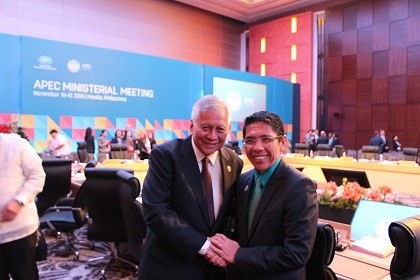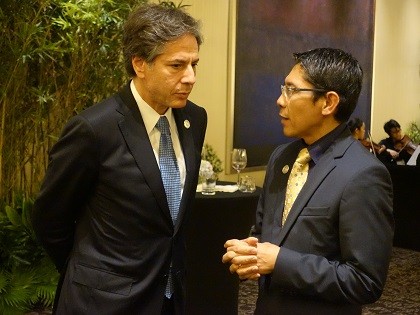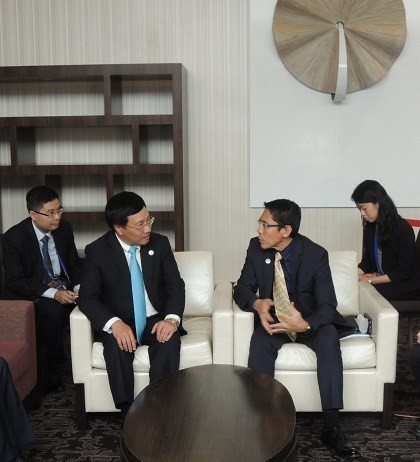


Senior Minister of State Dr Mohamad Maliki Osman attended the 27th Asia Pacific Economic Cooperation (APEC) Ministerial Meeting (AMM) in Manila, the Philippines, from 16 to 17 November 2015.
At the AMM, Dr Maliki expressed condemnation for the recent terrorist attacks in Paris, and called for those responsible to be brought to justice. He emphasised the need for the international community to stand together in the fight against terrorism and to remain vigilant against threats to our people. He also offered sympathies to the victims, as well as their families and loved ones.
In addition, Dr Maliki spoke on the issue of food security, including (i) the need to reduce food loss and waste; (ii) the importance of a rules-based multilateral trading system in helping to achieve food security; (iii) food safety; and (iv) the impact of climate change and other extreme events on food production. He also noted how the APEC Disaster Risk Reduction Framework could help rally support to address issues such as trans-boundary haze arising from forest fires. The full text of Dr Maliki’s statement is attached.
At the sidelines of the AMM, Dr Maliki met with US Deputy Secretary of State Antony Blinken, where they discussed the issues related to the South China Sea, the Trans-Pacific Partnership (TPP), and the fight against terror. Separately, Dr Maliki was hosted to a lunch by Brunei Minister at the Prime Minister’s Office, and Second Minister of Foreign Affairs and Trade Pehin Lim Jock Seng where they reaffirmed the warm relationship between the two countries. Dr Maliki also met Philippines Secretary of Foreign Affairs Albert del Rosario and reaffirmed our strong bilateral ties.
In addition, Dr Maliki met with Vietnam Deputy Prime Minister and Minister of Foreign Affairs Pham Binh Minh, Papua New Guinea Minister for Foreign Affairs and Immigration Rimbink Pato, and Chile Minister of Foreign Affairs Heraldo Muñoz Valenzuela.
Separately, Dr Maliki also met with the Singaporean youth delegates participating in APEC Voices of the Future, an annual program that allows young people and educators from the 21 APEC Economies to attend meetings on the sidelines of the APEC Economic Leaders’ Meeting.
. . . . .
MINISTRY OF FOREIGN AFFAIRS
SINGAPORE
17 NOVEMBER 2015
27th APEC Ministerial Meeting Plenary Session 2
Intervention on Food Security and the APEC Disaster Risk Reduction Framework
1 Mr Chairman, let me join our colleagues in offering our deepest sympathies to the victims of the Paris attacks as well as their families and loved ones. These heinous acts must be condemned and those responsible must be brought to justice. These attacks remind us that the international community must stand together in the fight against terrorism and remain vigilant against the threats to our people.
2 I would like to thank the Philippines for the excellent arrangements for the AMM and the warm hospitality provided to me and my delegation. While there are many important issues on the table today, I will focus like to on two topics, namely Food Security, and the APEC Disaster Risk Reduction Framework.
3 Food security is a complex sustainable development issue that remains a global challenge today. According to the Food and Agriculture Organisation (FAO), the world must increase its food production by 60% by 2050, or risk serious food shortages that could bring social unrest and civil wars. Singapore is thus glad that this issue features prominently in the agenda of the UN and key regional fora, including APEC. APEC Agriculture Ministers issued the Beijing Declaration on APEC Food Security last year, which outlined key areas of focus, including boosting agricultural productivity through science and technology; and enabling agriculture to be more resilient to climate change and disasters. The Philippines’ theme for food security in 2015 builds on this good work. In this connection, there are four specific areas I would like to touch on:
4 First, Singapore recognises the importance of reducing food loss and waste holistically by following the three principles of reduction, redistribution and recycling to ensure sustainable food systems. We have made changes to our legislation to require mandatory reporting of waste data, including food waste, by large commercial premises starting with hotels and shopping malls. Singapore also supports R&D to create technology that can improve post-harvest handling and reduce food loss, and reconstitute by-products into food and animal feed. There is a new generation of industry players who are open to adopting technology for reducing food loss or waste and value-adding food by-products. We should continue to pursue collaborative partnerships together. To help the local industry players conduct R&D on new and enhanced production technologies and invest in transformational farming systems, the Singapore Government launched a S$63 million Agriculture Productivity Fund (APF) last year to support such innovative applications.
5 Second, Singapore believes that a rules-based multilateral trading system under the WTO is a cornerstone to achieving food security. Trade-distorting measures such as export bans not consistent with WTO rules affect production and threaten livelihoods in both food importing and exporting countries, whether developing or otherwise.
6 Besides ensuring free and open trade of agricultural products, APEC economies and their private sector partners can also play an enhanced role in agricultural investment throughout the entire food value chain, for example, in creating better infrastructure and logistics.
7 Third, food safety is an integral part of food security and is a shared responsibility that requires the combined efforts of governments and industry. It is important to take a preventive and long-term approach to address animal and plant health, which underlies food safety. Animal or plant disease outbreaks and other biosecurity concerns pose a serious threat to global food security and public health, especially if it spreads across borders. There would also be economic and international trade consequences. The prompt sharing of information on disease situations, and reporting of outbreaks is critical in aiding the prevention and control of livestock diseases by countries.
8 Fourth, we need to look at how best to address the issues related to climate change and other extreme events. According to the Fifth Assessment Report of the Intergovernmental Panel on Climate Change, rising temperatures and increased frequency of extreme events will have direct and negative impact on important components of food security such as crops, fisheries and livestock. For example, the FAO forecasts that global output of milled rice for the July 2015 to June 2016 crop year would be cut further by 2 million tons to 491 million tons, due partly to the strong El Niño weather phenomenon. Singapore is affected too as some of our fish farms have experienced losses in their fish stock in recent years due to plankton bloom resulting from a confluence of several unfavourable environmental and weather conditions.
9 Further, new policies to encourage the development of green renewable energy to achieve a range of national development objectives have seen bioenergy developments, particularly in the biofuel sector, expanding at a fast pace. However, these developments are forging ahead with little coordinated assessment of the potential impact on the region’s natural resource base, the environment and food security. There is a need for policy makers to manage the trade-offs between bioenergy and food security, and develop a comprehensive strategy on sustainable and integrated food and biofuels production and consumption. We should also enhance partnerships with regional and international organisations to promote collaborative R&D and technology transfer in food security and bioenergy.
10 Climate-smart Agriculture (CSA) is one solution that can help to sustainably improve agricultural productivity and build the resilience of agricultural and food security systems to climate change. Singapore thus supports the development of long term adaptation measures for farms to increase resilience, and has co-sponsored several APEC projects relating to the sharing of best practices and capacity building in CSA.
11 Cooperation and collaboration between economies is crucial to tackling the problem of climate change and the damage inflicted by extreme events, which brings me to my next topic, the APEC Disaster Risk Reduction Framework.
12 Nearly half of the world’s natural disasters happen in the Asia Pacific region, including tragedies such as Typhoon Haiyan and the Tohoku Earthquake. The APEC Disaster Risk Reduction Framework is timely as it recognises the importance of preparing economies to manage disasters and extreme events within the rubric of sustainable economic growth. The Framework is comprehensive in its reach, and brings together all of the relevant stakeholders. It also lays out clear action plans for economies to tackle situations together based on four mutually reinforcing pillars: Prevention and Mitigation, Preparedness, Response, and Rehabilitation.
13 We support the Framework and its calls for greater regional cooperation to address disasters which often affect not just one economy but the whole region. No economy can build up sufficient capacity to cater for all extreme events. The surge in demand for disaster relief can be so high that victims in an affected economy will almost certainly benefit from additional resources and support from external sources.
14 One recent instance of international cooperation occurred just last month when several countries offered or extended assistance to put out the forest fires, which had produced the thick haze covering large parts of Southeast Asia. This is a recurrent man-made problem that has harmed the environment, led to a loss of biodiversity, impaired the health of millions, and hampered economic growth and tourism. Singapore has enacted domestic legislation to take legal action against those responsible for the haze, but closer cross-border collaboration and policy coordination are needed to tackle such transboundary environmental threats more effectively. Indeed, it requires a concerted international and sustainable solution. We believe that the APEC Disaster Risk Reduction Framework can play a significant role in rallying support to achieve this.
15 Mr Chairman, Singapore supports the APEC priorities to build sustainable and resilient communities, which in turn will facilitate economic growth and prosperity in the Asia Pacific. Singapore will work closely with the Philippine Chair and our APEC colleagues towards a successful and substantive Summit.